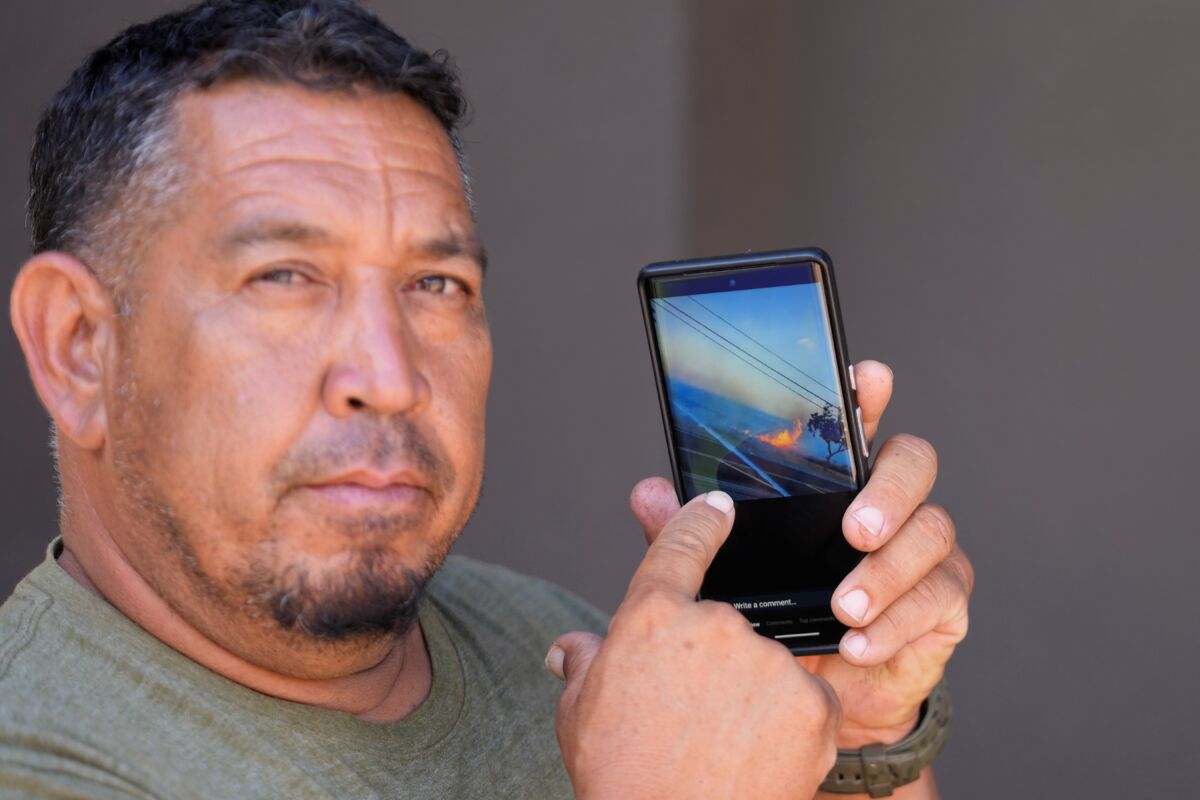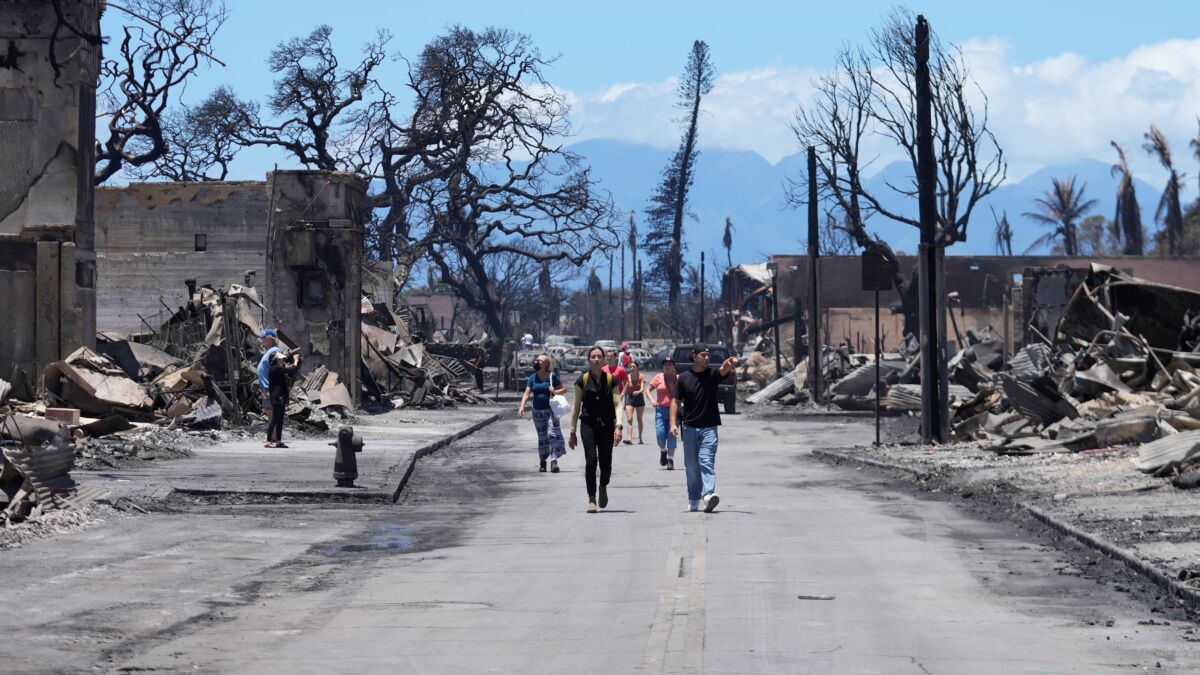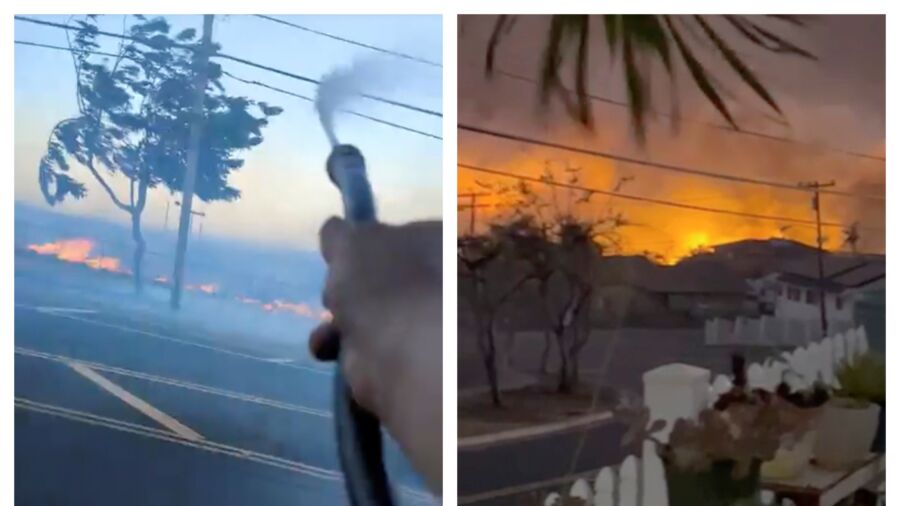Awakened by howling winds that tore through his Maui neighborhood, Shane Treu went out at dawn and saw a wooden power pole suddenly snap with a flash, it is sparking, popping line falling to the dry grass below and quickly igniting a row of flames.
He called 911 and then turned on Facebook video to livestream his attempt to fight the blaze in Lahaina, including wetting down his property with a garden hose.
“I heard ‘buzz, buzz,’” the 49-year-old resort worker recounted to The Associated Press. “It was almost like somebody lit a firework. It just ran straight up the hill to a bigger pile of grass and then, with that high wind, that fire was blazing.”
Mr. Treu’s video and others captured the early moments of what would become the deadliest U.S. wildfire in more than a century. Now the footage has emerged as key evidence pointing to fallen utility lines as the possible cause. Hawaiian Electric Co. faces criticism for not shutting off the power amid high wind warnings and keeping it on even as dozens of poles began to topple.

A class-action lawsuit has already been filed seeking to hold the company responsible for the deaths of more than 100 people. The suit cites the utility’s own documents showing it was aware that preemptive power shutoffs such as those used in California were an effective strategy to prevent wildfires but never adopted them.
“Nobody likes to turn the power off—it’s inconvenient—but any utility that has significant wildfire risk, especially wind-driven wildfire risk, needs to do it and needs to have a plan in place,” said Michael Wara, a wildfire expert who is director of the Climate and Energy Policy Program at Stanford University. “In this case, the utility did not.”
“It may turn out that there are other causes of this fire, and the utility lines are not the main cause,” Mr. Wara said. “But if they are, boy, this didn’t need to happen.”
Hawaiian Electric declined to comment on the accusations in the lawsuit or whether it has ever shut down power before due to high winds. But President and CEO Shelee Kimura noted at a news conference Monday that many factors go into that decision, including the possible effect on people who rely on specialized medical equipment and firefighters who need power to pump water.
“Even in places where this has been used, it is controversial, and it’s not universally accepted,” she said.
Maui Police Chief John Pelletier also expressed frustration at the news conference that people were complaining both that power was not cut off earlier and that too many people were unaccounted for because of a lack of cellphone and internet service.
“Do you want notifications or do you want the power shut off?” he said. “You don’t get it both ways.”
Mikal Watts, one of the lawyers behind the lawsuit, told the AP this week that he was in Maui, interviewing witnesses and “collecting contemporaneously filmed videos.”
“There is credible evidence, captured on video, that at least one of the power line ignition sources occurred when trees fell into a Hawaiian Electric power line,” said Mr. Watts, who confirmed he was referring to Mr. Treu’s footage.
Mr. Treu recorded three videos to Facebook on Aug. 8 starting at 6:40 a.m., three minutes after authorities say they received the first report of the fire. Holding a hose in one hand and his phone in the other, he streamed live as the first police cruisers arrived and can be heard warning officers about the live power lines laying in the road.
At one point, he zooms the camera in on a cable dangling in a charred patch of grass, surrounded by orange flames.
Mr. Treu’s neighbor, Robert Arconado, also recorded videos that he provided to the AP. Mr. Arconado’s footage, which starts at 6:48 a.m., shows a lone firefighter headed toward the flames as they continued to spread west downhill and downwind along Lahainaluna Road, toward the center of town.
By 9 a.m., Maui officials declared the fire “100 percent contained,” and the firefighters left. But about 2 p.m., Mr. Arconado said the same area had reignited.
A video he filmed at 3:06 p.m. shows smoke and embers being carried toward town as howling winds continued to lash the island. Mr. Arconado continued to film for hours, as towering pillars of flame and smoke billowed from the neighborhoods downhill, forcing people to jump into the ocean to escape.
“It was scary, so scary,” Mr. Arconado said. “There was nowhere to go … I witnessed every single thing. I never go to sleep.”
Mr. Treu’s and Mr. Arconado’s homes were spared, but satellite imagery reviewed by the AP shows that starting about 500 yards downwind whole neighborhoods were reduced to ash. Though experts say the early evidence suggests multiple blazes may have been ignited in and around Lahaina on Aug. 8, there were no recorded lightning strikes or other apparent natural causes for the fires.

Robert Marshall, CEO of Whisker Labs, a company that collects and analyzes electrical grid data, said sensors installed throughout Maui to detect sparking power lines showed a dangerously high number of such live wire incidents that night and into the following morning. The sensors, 70 in all, record breaks in electric transmission after trees fall on power lines or other accidents, and they showed dozens of such faults in areas where fires likely broke out and around the time the blazes probably started.
The faults, which Mr. Marshall likened to a series of circuit breakers tripping at the same time, were remarkable for the amount of power lost, a third of the usual 120 volts coursing through lines. Marshall said he couldn’t say whether any of the sparks resulted in a fire, only noting that there were many opportunities for it to happen.
“A substantial amount of energy was discharged,” said Mr. Marshall, pointing to a graph on his computer screen with several lines plunging at the same time. “Any one of these faults could have caused a wildfire, any could have been an ignition source.”
After the 2018 Camp Fire in northern California killed 85 people in a disaster caused by downed power lines, Pacific Gas & Electric agreed to pay more than $13.5 billion to fire victims. State regulators adopted new procedures requiring utilities to turn off the electricity when forecasters predict high winds and dry conditions that might cause a fire to spread.
In Maui, the National Weather Service first began alerting the public about dangerous fire conditions on Aug. 3. Forecasters issued a “red flag warning” on Aug. 7, alerting that the combination of high winds from a Category 4 hurricane churning offshore and drought conditions driven by climate change would create ideal conditions for fire.
Even though Hawaiian Electric officials specifically cited the Camp Fire and California’s power shutoff plan as examples in planning documents and funding requests to state regulators, on the day of the Maui fire there was no procedure in place for turning off the island’s grid.
Mr. Wara said the video posted by Mr. Treu also raised questions about Hawaiian Electric’s assertion that it had disabled an automatic recharge mechanism that turns electricity back on after a failure because it appeared that the downed wire Mr. Treu recorded was still alive.
Hawaii Attorney General Anne Lopez announced last week that she opened “a comprehensive review of critical decision-making and standing policies leading up to, during and after the wildfires.”
Hawaiian Electric’s Ms. Kimura said the company had started its own investigation. Its shares have plummeted by 60 percent over the last week on fears the company may have to pay big damages.
Mr. Watts, one of the lawyers suing the company, said the fire that destroyed Lahaina was predictable, given the weather and fuel conditions. He said Hawaiian Electric documents show the company knew its grid on Maui was degraded after decades of neglect. Old power poles were supposed to be replaced between 2019 and this year, but he alleges the company delayed the work.
“That is why the town of Lahaina is decimated, thousands are now homeless and hundreds will mourn the loss of their innocent loved ones,” he said. “This is an unprecedented tragedy that was an entirely preventable tragedy.”
Jennifer Potter, who lives in Lahaina and until last year was a member of the Hawaii Public Utilities Commission, said a comprehensive wildfire mitigation plan should have been established years ago.
“There’s more that could have been done. Now we have 20/20 hindsight,” she said. “This just doesn’t need to happen anymore.”
By Michael Biesecker, Bernard Condon And Jennifer Mcdermott

